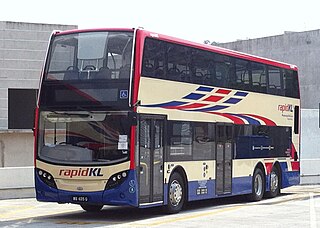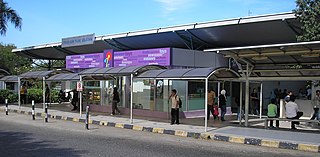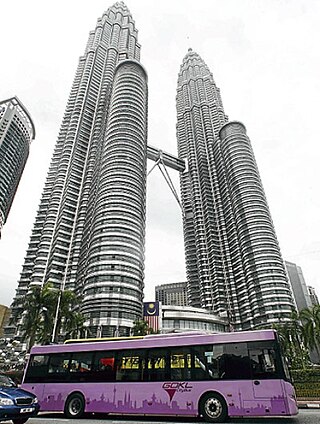
Kuala Lumpur, officially the Federal Territory of Kuala Lumpur and colloquially referred to as KL, is a federal territory and the ceremonial, legislative and judicial capital city of Malaysia. It is one of the fastest growing cities in Asia and the largest city in Malaysia, covering an area of 243 km2 (94 sq mi) with a census population of 1,982,112 as of 2020. Greater Kuala Lumpur, also known as the Klang Valley, is an urban agglomeration of 7.564 million people as of 2018. It is among the fastest growing metropolitan regions in Southeast Asia, both in population and economic development.

The ERL KLIA Ekspres is an express airport rail link servicing the Kuala Lumpur International Airport (KLIA) in Malaysia. It runs from KL Sentral, the main railway station of Kuala Lumpur to KLIA as well as its low-cost terminal, klia2. The line is one of the two services on the Express Rail Link (ERL) system, sharing the same tracks as the KLIA Transit. The KLIA Transit stops at all stations along the line, whereas the KLIA Ekspres runs as a direct non-stop express service between KL Sentral and KLIA/klia2. The is operated by Express Rail Link Sdn. Bhd. (ERL). Unlike most railways in Malaysia, it uses standard gauge instead of metre gauge.

Kuala Lumpur Sentral Station is a transit-oriented development that houses the main railway station of Kuala Lumpur, the capital of Malaysia. Opened on 16 April 2001, KL Sentral replaced the old Kuala Lumpur railway station as the city's main intercity railway station. KL Sentral is the largest railway station in Malaysia, and the second largest in Southeast Asia, behind Krung Thep Aphiwat Central Terminal in Bangkok, Thailand.

The ERL KLIA Transit is a commuter rail service which serves as an airport rail link to the Kuala Lumpur International Airport (KLIA) in Malaysia. It runs from KL Sentral, the main railway station of Kuala Lumpur to KLIA as well as its low-cost terminal, klia2. The line is one of the two services on the Express Rail Link (ERL) system, sharing the same tracks as the KLIA Ekspres. KLIA Transit stops at all stations along the line, whereas KLIA Ekspres runs an express, non-stop service between KL Sentral and KLIA and links KLIA with KLIA2. The ERL is operated by Express Rail Link Sdn. Bhd. (ERL).

Touch 'n Go is a contactless smart card system used for electronic payments in Malaysia. The system was introduced in 1997 and is widely used for toll payments on highways, public transportation, parking, and other services. The card is equipped with a radio-frequency identification (RFID) chip that allows users to make payments by simply tapping the card on a reader device. Touch 'n Go cards can be reloaded with funds either online or at designated reload kiosks. The system has become a popular and convenient way for Malaysians to make cashless transactions.

Rapid KL is a public transportation system owned by Prasarana Malaysia and operated by its subsidiaries Rapid Rail and Rapid Bus. With its coverage throughout Kuala Lumpur and Klang Valley areas, it was followed by a federal government restructuring of public transport systems in Kuala Lumpur after the bankruptcy of STAR and PUTRA Light Rapid Transit operators, the precursors to the Ampang/Sri Petaling Lines and Kelana Jaya Line respectively. In 2003, it had inherited bus services and assets formerly operated and owned by Intrakota and Cityliner after being bailed out. Four years later, the Malaysian government had bailed out KL Infrastructure Group, the owner and operation concession holder for the Kuala Lumpur monorail, and had placed it under ownership of Prasarana.
Prasarana Malaysia Berhad (Prasarana) (English: Malaysian Infrastructure Limited) is a 100% government-owned company which was set up by Ministry of Finance (Malaysia) as a corporate body established under the Minister of Finance (Incorporation) Act 1957 to own the assets of multi-modal public transport operator in Malaysia, under the government's move to restructure the city's public transport system. It is one of the largest public-transport companies in Malaysia other than Konsortium Transnasional Berhad. As a government-owned company since 1998, it operates stage bus and light metro services via several wholly owned subsidiaries.

Rapid Bus Sdn Bhd is the largest bus operator in Malaysia operating mainly in urban areas of Klang Valley, Penang & Kuantan. As of February 2023, Rapid KL service brands unit of Rapid Bus, has operates 113 normal routes and also 69 MRT Feeder Bus routes, along with 8 Nadiputra routes in Putrajaya.

Titiwangsa station is a rapid transit interchange station in Kuala Lumpur, Malaysia. The station is served by the LRT Ampang and Sri Petaling Lines, the KL Monorail Line and the MRT Putrajaya Line. The station allows seamless physical and fare integration between the four train lines.

Bandar Tasik Selatan station (BTS) is a major Malaysian interchange station located next to and named after Bandar Tasik Selatan, in Kuala Lumpur. The station serves as both a stop and an interchange for the KTM Komuter's Seremban Line, KTM ETS, the LRT Sri Petaling Line, and the Express Rail Link's KLIA Transit trains. BTS is integrated with the Terminal Bersepadu Selatan bus hub (TBS). BTS and TBS are developed as an intermodal transportation hub.
Transport in Greater Kuala Lumpur includes a road network, a railway network, airports, and other modes of public transport. The Klang Valley is an urban conglomeration consisting of the city of Kuala Lumpur, as well as surrounding towns and cities in the state of Selangor. The Klang Valley has the country's largest airport, the Kuala Lumpur International Airport (KLIA), as well as the country's largest intermodal transport hub and railway station, Kuala Lumpur Sentral.

The Sungai Buloh station is an integrated railway station serving the suburb of Sungai Buloh in Selangor, Malaysia, which is located to the northwest of Kuala Lumpur.

Rapid Penang is a public bus brand in the State of Penang, Malaysia. Formed as a subsidiary of Prasarana Malaysia in 2007, to date it is the main public transport operator within Penang; its bus network serves commuters within Greater Penang, including the neighbouring towns in Kedah and Perak.
Konsortium Transnasional Berhad (KTB) (MYX: 4847) is one of the largest public bus operator in Malaysia. The company provides services of stage buses and express buses covering all major cities and towns in Peninsular Malaysia as well as routes to Singapore. KTB debut on Bursa Malaysia on 15 June 2007.

The BRT Sunway Line is a bus rapid transit (BRT) line that is part of the Klang Valley Integrated Transit System servicing the southeastern suburbs of Petaling Jaya, Malaysia. It is world's first all-electric Bus Rapid Transit system.
Rapid Kuantan is a corporate brand owned by Prasarana Malaysia Berhad (Prasarana) to operate stage bus services in Kuantan, Pahang, Malaysia. It was launched on 1 December 2012.

The Klang Valley Integrated Transit System is an integrated transport network that primarily serves the area of Klang Valley and Greater Kuala Lumpur. The system currently consists of 11 fully operating rail lines; two commuter rail lines, five rapid transit lines, one bus rapid transit line and two airport rail links to the Kuala Lumpur International Airport and another one to the Sultan Abdul Aziz Shah Airport.

Go KL City Bus is a free bus service in the city centre of Kuala Lumpur, Malaysia. Previously managed by Land Public Transport Commission (SPAD), the services were taken over by Kuala Lumpur City Hall (DBKL) by 1 January 2019.

Pengangkutan Awam Putrajaya Travel & Tours Sdn Bhd dba Nadi Putra is the city bus operator in Putrajaya, the administrative capital of Malaysia, mainly serving Putrajaya city and nearby resident areas. Originally established as an agency of Putrajaya Corporation under the Ministry of Federal Territories, it was privatised in 2018.
Buses play a major role in the public transport of Malaysia, as well as seeing extensive private use. While rail transport has increased over the recent years due to road congestion, the same does not apply to buses, which have generally been used less in most of the area.
















